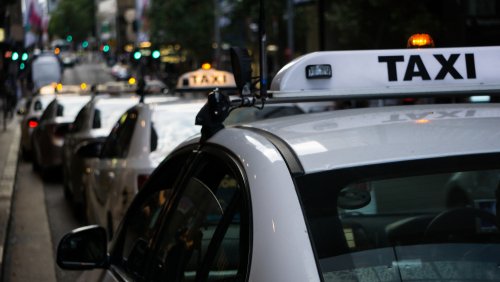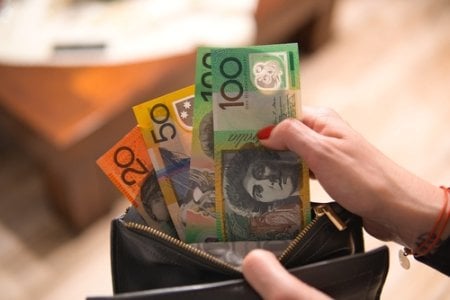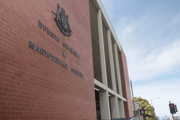Protect your wallet: How Aussies are being fleeced by ‘unscrupulous’ taxi drivers
Australia is a well-known tourist hotspot, famous for its beautiful beaches and diverse wildlife. However, it is also a place where tourists and locals alike fall prey to scams.
One of the most concerning issues is taxi overcharging, which has been a persistent problem in Sydney and perhaps other cities across the country.
The tales of taxi rip-offs are not new, but they seem to persist despite efforts to eliminate these dodgy practices.
Graham Cooke, Head of Consumer Research at Finder, expressed frustration over taxi rip-offs targeting him and people he knows in an article.
He recalled: ‘I had a frustrating battle to try and get a refund for a taxi after being blatantly overcharged after a night out in Sydney. I tapped my card without thinking at the destination and found I'd been charged $70 for a $25 fee.’
‘That was two years ago and I thought things had gotten better. So you can understand my shock when a family friend was charged $90 for a taxi ride from Sydney Airport to Kensington—a fare that should have cost around $40 in a taxi, and under $30 in an Uber.’
This is not an isolated case. Graham reported another similar incident where a colleague was overcharged $90 for a short trip from Newtown to Annandale, which should have cost $25.
‘How can Sydney claim to be a world-class city when tourists and locals alike are routinely fleeced by unscrupulous taxi drivers, or just flat-out refused?’ he asked.
Graham claimed that while many taxi drivers are honest and provide excellent service, the lack of transparent pricing and accountability in the industry creates opportunities for exploitation.
This is particularly true for those who might be tired after a long flight, less inclined to question a fare, or not familiar with alternative rideshare services.
He also painted a stark contrast with rideshare platforms, where users receive upfront fare estimates and benefit from a more streamlined refund process in case of any issues.
‘In the taxi industry, customers often face a confusing web of shifting responsibility, being passed between taxi companies, payment processors, and networks, all while nobody takes responsibility,’ he stated.
Despite the introduction of new regulations in May 2023 that impose a $1,000 fine on taxi drivers who refuse a ride or inflate a fare, overcharging still seems to be a persistent problem.
Over 520 taxi drivers in the state have been disciplined, yet the stories of overcharging continue to emerge.
More than that, Graham shared that obtaining a refund is challenging.
‘Despite keeping a receipt, I found getting a refund incredibly difficult,’ he said.
‘The taxi company and terminal operator denied responsibility, as did the [New South Wales] taxi regulator who told me they had no power to enforce the fare order.’
‘Only after contacting my credit card company, who for some reason had an easier time contacting the driver than the company he drove for, was I finally able to get a refund for the difference,’ he continued.
Graham stated that this situation underscores the need for more effective regulation.
‘It seems the current system is insufficient to deter dishonest taxi practices and the NSW government has been slow to enact meaningful reforms,’ he expressed.
‘Sydney's taxi sector needs an urgent overhaul before its reputation suffers irreparable damage,’ he added.
He also wrote that the Point to Point Transport Commissioner in NSW must be empowered to ensure drivers adhere to the Fares Order, and taxi companies should be required to provide clear fare breakdowns on receipts.
‘A system should be in place for questioning fares after the fact, and other states should follow suit,’ he said.
Graham shared steps on how to get your money back if you were overcharged by taxis:
‘It's time the taxi industry embraced transparent pricing, customer service, and accountability. If they do not, they risk being left behind by changing technology and disillusioned customers,’ he added.
 Taxi scam are also prevalent in other travel destinations. In fact, Aussies visiting Bali are being cautioned about this scam, with reports of fake operators mimicking legitimate services.
Taxi scam are also prevalent in other travel destinations. In fact, Aussies visiting Bali are being cautioned about this scam, with reports of fake operators mimicking legitimate services.
Have you or someone you know been a victim of a taxi scam? Share your experiences and tips on how to avoid these situations in the comments below.
One of the most concerning issues is taxi overcharging, which has been a persistent problem in Sydney and perhaps other cities across the country.
The tales of taxi rip-offs are not new, but they seem to persist despite efforts to eliminate these dodgy practices.
Graham Cooke, Head of Consumer Research at Finder, expressed frustration over taxi rip-offs targeting him and people he knows in an article.
He recalled: ‘I had a frustrating battle to try and get a refund for a taxi after being blatantly overcharged after a night out in Sydney. I tapped my card without thinking at the destination and found I'd been charged $70 for a $25 fee.’
‘That was two years ago and I thought things had gotten better. So you can understand my shock when a family friend was charged $90 for a taxi ride from Sydney Airport to Kensington—a fare that should have cost around $40 in a taxi, and under $30 in an Uber.’
This is not an isolated case. Graham reported another similar incident where a colleague was overcharged $90 for a short trip from Newtown to Annandale, which should have cost $25.
‘How can Sydney claim to be a world-class city when tourists and locals alike are routinely fleeced by unscrupulous taxi drivers, or just flat-out refused?’ he asked.
Graham claimed that while many taxi drivers are honest and provide excellent service, the lack of transparent pricing and accountability in the industry creates opportunities for exploitation.
This is particularly true for those who might be tired after a long flight, less inclined to question a fare, or not familiar with alternative rideshare services.
He also painted a stark contrast with rideshare platforms, where users receive upfront fare estimates and benefit from a more streamlined refund process in case of any issues.
‘In the taxi industry, customers often face a confusing web of shifting responsibility, being passed between taxi companies, payment processors, and networks, all while nobody takes responsibility,’ he stated.
Despite the introduction of new regulations in May 2023 that impose a $1,000 fine on taxi drivers who refuse a ride or inflate a fare, overcharging still seems to be a persistent problem.
Over 520 taxi drivers in the state have been disciplined, yet the stories of overcharging continue to emerge.
More than that, Graham shared that obtaining a refund is challenging.
‘Despite keeping a receipt, I found getting a refund incredibly difficult,’ he said.
‘The taxi company and terminal operator denied responsibility, as did the [New South Wales] taxi regulator who told me they had no power to enforce the fare order.’
‘Only after contacting my credit card company, who for some reason had an easier time contacting the driver than the company he drove for, was I finally able to get a refund for the difference,’ he continued.
Graham stated that this situation underscores the need for more effective regulation.
‘It seems the current system is insufficient to deter dishonest taxi practices and the NSW government has been slow to enact meaningful reforms,’ he expressed.
‘Sydney's taxi sector needs an urgent overhaul before its reputation suffers irreparable damage,’ he added.
He also wrote that the Point to Point Transport Commissioner in NSW must be empowered to ensure drivers adhere to the Fares Order, and taxi companies should be required to provide clear fare breakdowns on receipts.
‘A system should be in place for questioning fares after the fact, and other states should follow suit,’ he said.
Graham shared steps on how to get your money back if you were overcharged by taxis:
- If you’re travelling within a city, using a rideshare service might be a safer and less expensive option, but always check for surge pricing first.
- If you notice a discrepancy in your fare, immediately question the driver.
- Paying by credit card provides added protection. Always verify that the amount on the card terminal matches the amount on the meter, and request a receipt.
- If you cannot resolve a taxi issue with the company, you can lodge a complaint with Fair Trading NSW or your local state equivalent.
- The Australian Taxi Industry Association can assist only if the taxi is a member.
- If you have exhausted all other options, then the last resort may be to raise a dispute with your credit card company.
‘It's time the taxi industry embraced transparent pricing, customer service, and accountability. If they do not, they risk being left behind by changing technology and disillusioned customers,’ he added.
Key Takeaways
- Taxi passengers in Sydney have reported being overcharged by drivers, which tarnishes the city's reputation as a welcoming international destination.
- Although some taxi drivers provide honest services, a problem with transparency and accountability allows for passenger exploitation, especially among tourists.
- New regulations introduced in May 2023 impose a $1,000 fine on taxi drivers who refuse rides or inflate fares, but enforcement remains an issue.
- Graham Cooke argued that the Point to Point Transport Commissioner in NSW should ensure compliance with Fares Orders and that taxi companies provide fare breakdowns to protect customers’ rights.
Have you or someone you know been a victim of a taxi scam? Share your experiences and tips on how to avoid these situations in the comments below.









